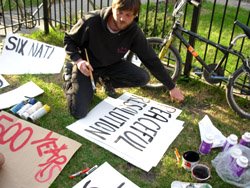
Following last weeks police raid on the Six Nations camp at Douglas Creek in Canada, support poured in from around the world. (see http://oreaddaily.blogspot.com/2006/04/we-shall-not-be-moved.html
and http://oreaddaily.blogspot.com/2006/04/six-nations-arent-going-to-back-down.html for earlier articles).
The International Indian Treaty Council filed a notice with the U.N. High Commissioner on Human Rights and the Special Rapporteur on the Rights of Indigenous Peoples.
E-mails and Web blogs provided intense coverage, as did Canadian national newspapers. Opposition parties raised questions in provincial and federal parliaments.
This morning supporters slowed traffic in Winnipeg.
The following article comes from First Perspective.
Caledonia protesters delay Winnipeg downtown traffic
by FP/Drum Staff
WINNIPEG -- Four-dozen demonstrators showed their support for Six Nations Mohawks on Friday morning by partially closing a Winnipeg bridge prior to police intervention.
They closed off the right hand lane on the Midtown bridge for a very short period of time likely less than a minute or two before police, who were stationed nearby, moved in and ordered the demonstrators off the roadway portion of the bridge.
"Nobody got arrested and nobody got hurt, so we will live to fight another day," said Peter Kulchyski, who was carried off the traffic portion of the bridge by three members of the Winnipeg police.
"I think it went pretty good considering people were not trained properly," said Kulchyski, an Aboriginal studies professor who is on sabbatical and was acting as picket captain.
He was a veteran of protests dating back to the 1970s, but many of the demonstrators were new to this type of activity. With more experience, they could have held up traffic a while longer, he explained afterward.
The evening before, when planning strategy, they decided their goal would be to slow traffic but leave one lane open while pamphlets were passed to drivers and passengers in other lanes. During the demonstration, police ordered the picketers onto the sidewalks and walkways, saying loudly that they were doing this to keep demonstrators from being hit by vehicles.
After the police intervened, the demonstrators mostly confined themselves to the sidewalks and meridians, although occasionally they walked into the traffic lanes to hand out pamphlets while cars were stopped by red traffic lights. Close to a dozen cops watched.
The demonstration began around 8 a.m. and lasted about a half hour. Some motorists opened their car windows to take the pamphlets that were being handed out, but other drivers in the morning rush either refused to open windows or yelled at the demonstrators. Most of the verbal hostility occurred before police cleared the bridge.
"Some people did not want any information, but those who took it were supportive," said Shelagh Pizey-Allen, who estimated that 30-50 motorists took her pamphlets.
When the demonstrators returned to their drum circle on grass near the foot of the bridge there was general discussion of participation in future events. Heather Lightning, one of the organizers, said the extent of future actions would largely depend on what happens at the Caledonia camp site near Hamilton.
Lightning said the First Nations organizations in Manitoba haven't been active on the issue. That is why individual citizens both Aboriginal and non-Aboriginal decided to act. "The chiefs' organizations in the province haven't done anything," she said.
The only chief at the demonstration was Chief Terry Nelson of the Roseau River First Nation. Speaking prior to the demonstration, he said that it was a mistake for First Nations organizations, like Union of Ontario Indians, to tell people to stay away from the Caledonia site saying that they didn't want people going into an area that could be unsafe.
UOI had called for cooler heads to prevail, but Nelson said the Native people who were standing up for their rights were not responsible for cranking up tensions. "They should be condemning the police and courts."
He also said that people across the country would respond with railway blockades if the police or military move against the Six Nations camp at Caledonia and kill people.
The demonstration held Friday morning (April 29) is among a series of events being held across the country to show solidarity with the Six Nations and to deter governments and police from using force to evict demonstrators at a sub-division construction site at the town of Caledonia.
No comments:
Post a Comment